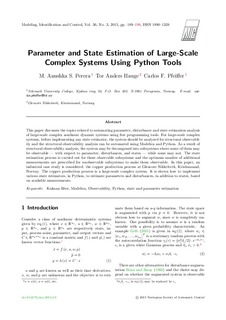Parameter and State Estimation of Large-Scale Complex Systems Using Python Tools
Journal article, Peer reviewed
Permanent lenke
http://hdl.handle.net/11250/2438463Utgivelsesdato
2015Metadata
Vis full innførselSamlinger
Originalversjon
Perera, A., Hauge, T. A., & Pfeiffer, C. (2015). Parameter and State Estimation of Large-Scale Complex Systems Using Python Tools. MIC Journal: Modeling, Identification and Control, 36(3), 189-198. http://dx.doi.org/10.4173/mic.2015.3.6Sammendrag
This paper discusses the topics related to automating parameter, disturbance and state estimation analysis of large-scale complex nonlinear dynamic systems using free programming tools. For large-scale complex systems, before implementing any state estimator, the system should be analyzed for structural observability and the structural observability analysis can be automated using Modelica and Python. As a result of structural observability analysis, the system may be decomposed into subsystems where some of them may be observable --- with respect to parameter, disturbances, and states --- while some may not. The state estimation process is carried out for those observable subsystems and the optimum number of additional measurements are prescribed for unobservable subsystems to make them observable. In this paper, an industrial case study is considered: the copper production process at Glencore Nikkelverk, Kristiansand, Norway. The copper production process is a large-scale complex system. It is shown how to implement various state estimators, in Python, to estimate parameters and disturbances, in addition to states, based on available measurements.
